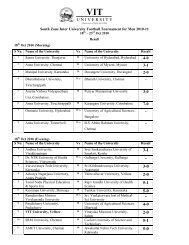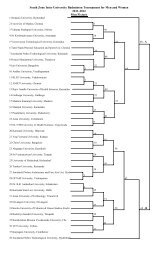Two Weeks Certified Summer Internship Program - VIT University
Two Weeks Certified Summer Internship Program - VIT University
Two Weeks Certified Summer Internship Program - VIT University
Create successful ePaper yourself
Turn your PDF publications into a flip-book with our unique Google optimized e-Paper software.
www.ti.com<br />
TI India Univeristy<br />
program<br />
UniTI<br />
www.uniti.in<br />
www.vit.ac.in<br />
Texas Instruments India <strong>University</strong> <strong>Program</strong> and<br />
SENSE Department, <strong>VIT</strong> <strong>University</strong>,<br />
Jointly announce a<br />
<strong>Two</strong> <strong>Weeks</strong> <strong>Certified</strong> <strong>Summer</strong> <strong>Internship</strong><br />
<strong>Program</strong><br />
Venue: <strong>VIT</strong> <strong>University</strong>, Vellore<br />
Date: May 23 – June 2<br />
About TI & TI India <strong>University</strong> <strong>Program</strong>:<br />
Texas Instruments is a major semiconductor manufacturer with a product portfolio of over 30,000 integrated<br />
circuits in areas like Digital Signal Processors, Microcontrollers, etc. Texas Instruments develops analog,<br />
digital signal processing, RF and DLP® semiconductor technologies that help customers deliver consumer<br />
and industrial electronics products with greater performance, increased power efficiency, higher precision,<br />
more mobility and better quality.<br />
Texas Instruments has strong <strong>University</strong> <strong>Program</strong>s in USA, Mexico, South America, Europe, China, Japan,<br />
and India. TI established its Indian operations in Bangalore in 1985.TI India has a <strong>University</strong> <strong>Program</strong><br />
known as “UniTI” through which universities can get support for labs, IC samples, teaching materials,<br />
events, train-the-trainer programs,etc. The TI India <strong>University</strong> <strong>Program</strong> (www.uniti.in) also helps Indian<br />
Universities in establishing teaching/research labs with association of TI and education Institutes.
About <strong>VIT</strong> <strong>University</strong>:<br />
Founded in 1984 as Vellore Engineering College, the institute was declared a <strong>University</strong> in recognition of<br />
its academic excellence by the Ministry of Human Resources Development, Government of India in 2001.<br />
The <strong>University</strong> has since grown by leaps and bounds – establishing excellent infrastructure spread over an<br />
impeccacably clean and green 300 acre campus - on way to fulfill the vision of the founder and Chancellor<br />
Dr. G. Viswanathan to make it truly world class. <strong>VIT</strong> today comprises of six constituent Schools and<br />
interdisciplinary Centers offering undergraduate, post graduate and research programs upto Ph.D level. <strong>VIT</strong><br />
holds the ISO 9002 certified by the DNV of the Netherlands. It is again accredited from IEE (UK). Further<br />
it has also been accredited by NBA (AICTE) and NAAC (UGC). In the Last seven years, <strong>VIT</strong> had more<br />
than 100 visiting professors, some of them staying 6 to 12 weeks for offering accelerated courses as well as<br />
participating in Workshops and Seminars for the benefit of students of <strong>VIT</strong> and also the industry around.<br />
About the School of Electronics Engineering<br />
The School offers B.Tech [ECE] and five M.Tech programs. Facilities for research leading to Ph.D. are<br />
available in many emerging areas. A major emphasis in both the undergraduate and post graduate program<br />
is teaching and learning process. School is actively involved in R&D activities and has sponsored projects<br />
from various agencies like DST, ISRO (RESPOND), and BRNS etc. It has MOU’s with industries and other<br />
reputed institution and R&D organization of our country and other parts of the world.<br />
About VLSI design Lab<br />
The VLSI Design Laboratory is equipped with<br />
• ASIC DESIGN LAB supported by CADENCE (Cadence Tools with 60 User License)<br />
• FPGA/SOPC Lab supported by ALTERA<br />
• MENTOR GRAPHICS Tools with 60 User License<br />
• ANALOG SYSTEM DESIGN LAB supported by TEXAS INSTRUMENTS<br />
This lab is being utilized by Engineers from VLSI, Embedded, Sensors and Mechatronics divisions for<br />
innovations in their Academic as well as Research projects<br />
About Workshop:<br />
Designing Analog Systems Using ASLK kit<br />
Analog System Design has become important in the design of embedded systems. The goal of this training<br />
is to provide Students/ Faculty an exposure to the fascinating world of analog and mixed-signal signal<br />
processing. As part of the training the participants can build analog<br />
systems using analog ICs and study their macro models,<br />
characteristics and limitations. This workshop focuses on system<br />
design along with basic circuit design. In this workshop, the intention<br />
is to expose the participants to the concepts of Analog System Design.<br />
The workshop will include<br />
a. Lectures from TI’ers/faculty from <strong>VIT</strong> <strong>University</strong>.<br />
b. Hands-on experiments on TINA simulation software and the<br />
Analog System Lab Kit.<br />
c. Design Challenge for the participants.<br />
d. Certificates will be awarded on successful completion of the<br />
internship.
The workshop will be suitable for students & faculty members of Electronics/ Telecommunication/<br />
Electrical/ Instrumentation/ Biomedical engineering who have taken a course on Linear Integrated Circuits.<br />
It is expected that the participants will be exposed to the concepts of Operational Amplifiers and Linear ICs.<br />
The participants must have used at least one device-level simulation tool.<br />
<strong>Internship</strong> Details:<br />
This is an excellent opportunity to understand the industrial trends in Analog System Design and get handson<br />
experience in the design, simulation and hardware implementation of analog subsystems. The following<br />
topics will be covered.<br />
Registration:<br />
� Exposure to TINA Simulation Software<br />
� Exposure to Macromodels<br />
� Exposure to Analog System Lab Kit<br />
� Design, Simulation, and Implementation of analog<br />
subsystems such as<br />
o Second-order filters<br />
o Self-tuned filters<br />
o Voltage-controlled oscillators (VCO)<br />
o Function generators<br />
o Phase-locked loop (PLL)<br />
o Automatic gain control (AGC)<br />
o DC-DC converter<br />
o Low Drop Out (LDO) regulator<br />
The workshop is open to<br />
� Faculty from Institutions teaching Analog System Design.<br />
� Engineering Students (both UG & PG level)<br />
Registration form can be downloaded from the following link:<br />
https://docs.google.com/document/d/1o1TTgbQ9X9dLL4LkkLWCB5qUlgIvRRMx06_rlyT_59c/edit<br />
Please fill out the registration form and send a scanned copy of the registration form and a scanned copy of<br />
the DD to Vaibhav Ostwal (ostwalvaibhav@ti.com) with the subject line “TI-<strong>VIT</strong> <strong>Summer</strong> <strong>Internship</strong>-<br />
Analog” and mark a copy to Prof. Sakthivel (rsakthivel@vit.ac.in). The payment (DD) must be made in the<br />
name of <strong>VIT</strong> <strong>University</strong>, payable at Vellore.<br />
Last day for registration is May 19, 2012. Registrations will be confirmed through e-mail by May 21,<br />
2012.
Registration Fee:<br />
With Accommodation Without Accommodation<br />
Students Rs.5000 Rs.2500<br />
Faculty Members Rs.6000 Rs.3000<br />
Contact details:<br />
Please contact Mr. R.Sakthivel, Assistant Professor, <strong>VIT</strong> <strong>University</strong>, 09994627570 for queries regarding<br />
hostel/hotel accommodation during the days of the workshop. For any queries regarding the workshop<br />
please write to Vaibhav Ostwal ostwalvaibhav@ti.com or call 080-25048335


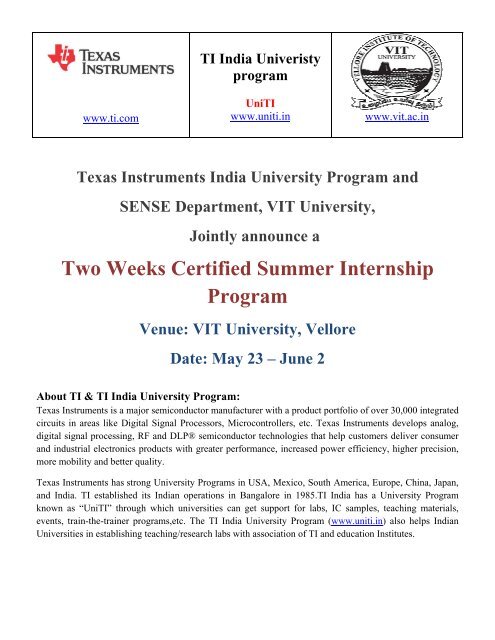
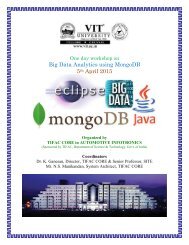
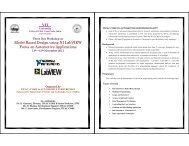
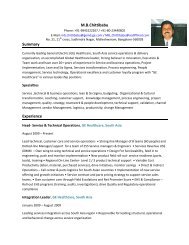
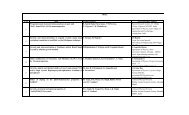
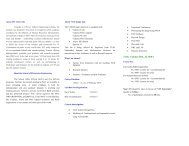
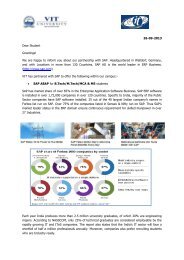
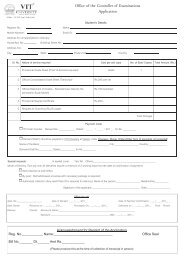
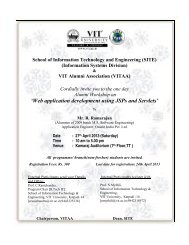
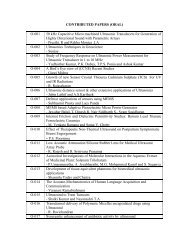
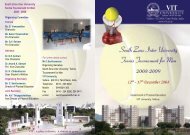
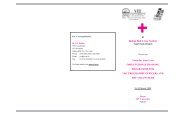
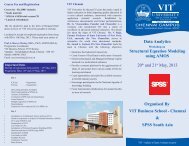
![[26th â 30th Oct 2009] - Result - VIT University](https://img.yumpu.com/48486076/1/184x260/26th-a-30th-oct-2009-result-vit-university.jpg?quality=85)
